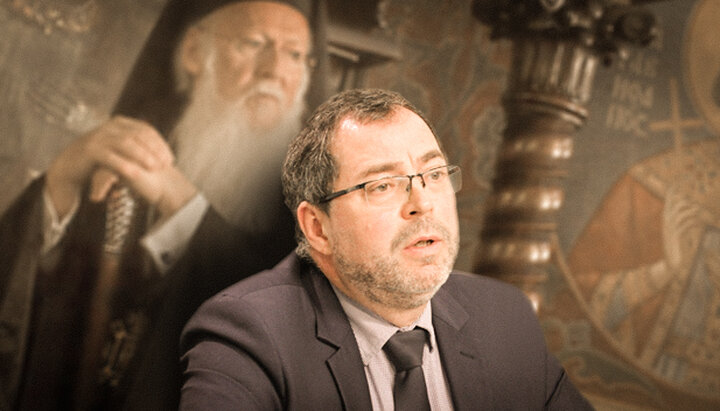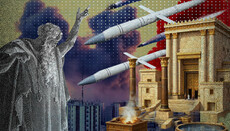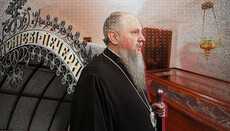Theses of Yurash on the eve of Patriarch Bartholomew’s visit

We will sort out and analyze an interview with odious state official Andrei Yurash.
On the eve of Patriarch Bartholomew's visit to Kyiv, one of the founding fathers of the Orthodox Church of Ukraine (OCU) Andrei Yurash gave an interview to the credo.press portal, in which he voiced some theses which benefit from attention.
To begin with, let's remember who Andrei Yurash is. In 2014-2020 he was the head of the Department for Religious and National Affairs of the Ministry of Culture of Ukraine and in this position contributed to both the creation of the (OCU) and all related processes: pressure on the Ukrainian Orthodox Church, illegal re-registration of communities, seizure of temples, etc. In 2020 he lost the competition to fill the vacancy of the head of the State Service for Ethnopolitics and Freedom of Conscience (the structure that replaced the above-mentioned Department for Religious Affairs) to Elena Bogdan, which he challenged in three courts and lost in all three. Due to the fact that attempts to leave A. Yurash in his previous position were unsuccessful, a separate bureaucratic structure was created for him, the Department for Religions and Nationalities within the Secretariat of the Cabinet of Ministers, of which he became the head. Also, Yurash is a defendant in a criminal case on abuse of office and participation in the fabrication of a criminal case against the cleric of the UOC, Archpriest Viktor Zemlianoy.
Below are the key takeaways from an interview with the credo.press portal.
Thesis 1: The visit of Patriarch Bartholomew is a visit of the highest level
A. Yurash: “It is very important that this visit will take place at the invitation of the President of Ukraine. That is, it will be a visit of the highest level. This is a symbolic confirmation that the Ukrainian state understands the significance of the role of the first hierarch in World Orthodoxy – both as a figure of general Christian value and as a church leader who has acceded to crucial developments in Ukraine."
First, the highest-level visits at the invitation of the President are visits by Heads of State and (to a lesser extent) government. The fact that the visit of Patriarch Bartholomew takes place at the invitation of V. Zelensky, and even more so as part of the celebration of the national holiday of Independence Day, convincingly proves that this is a visit of a politician, not a religious figure. Moreover, A. Yurash confirmed that Patriarch Bartholomew "acceded to crucial developments in Ukraine." However, what are these turning points? As you know, the OCU was created as part of the election campaign of former President P. Poroshenko and all the developments around this religious structure are predominantly political in nature. Why? Because both state agents and various political forces are constantly involved in these processes.
Secondly, according to the Constitution, Ukraine is a secular state, which means that it simply does not have the necessary tools to determine "the significance of the role of the first hierarch in World Orthodoxy." A secular state generally cannot determine the religious status of any person, his position within a certain religion, and so on. The state can and must ensure the equal enjoyment by all its citizens of the right to freedom of conscience and religion. Ukraine still is far from it off.
Thesis 2: OCU is a political project within the framework of the formation of Ukrainian statehood
A. Yurash: “A very positive sign is that the leadership of Ukraine at absolutely all levels confirms the continuity of its position – that it was no coincidence and it was natural that steps were taken towards church autocephaly. Actually, this is a strategic position of the Ukrainian state, <...> On the other hand, the State of Ukraine understands that the long-awaited institutionalization of the local Ukrainian church tradition, towards which Ukrainian society has been moving for over 100 years and which was accomplished with the blessing and participation of the Mother Church , is an important element of strengthening and spiritual bolstering of our statehood.”
These words contain a direct and unequivocal recognition that the OCU is a political, rather than a church project. A. Yurash is very pleased that the religious policy of the current President fully continues the policy of his predecessor, although in the first year of V. Zelensky's presidency, supporters of the OCU loudly complained that this policy had changed. Both under P. Poroshenko and today, from the lips of supporters of the OCU at all levels of power and social status, statements are heard that this religious structure is the backbone of Ukrainian statehood. Well, the supporters of the UOC, speaking about the Church, declare something completely different – viz. She is the Body of Christ and Her main task is the unity of man with God, rather than bolstering someone's statehood.
In addition, A. Yurash confirmed that the idea of Ukrainian autocephaly has existed for only a little more than 100 years, a scanty period by historical standards. In addition, if we take a little interest in history, we find out that this idea originally arose precisely in a political, and not at all religious, environment. It was first proclaimed on November 9, 1917 in Kiev at the 3rd All-Ukrainian Military Congress, and then at the so-called Council of 1921, at which there was not a single bishop and which was convened with the consent of the Bolsheviks. Subsequently, the idea of autocephaly was pulled onto the agenda only in those historical periods when political processes were stepped up.
Thesis 3: The Great Cross Procession of the UOC made an indelible impression
A. Yurash: “I very closely watched the procession with the cross, which took place in Kyiv on July 27. According to all objective observations, a smaller number of believers of the UOC took part in it in unity with the Moscow Patriarchate than two years ago. According to official and absolutely objective data, it was attended by 55 thousand people. Of course, this is a fairly numerous procession, but the promotion of the idea of 350 thousand participants is ideologically motivated, calculated for external and internal demand."
The Great Cross Procession made such a great impression on A. Yurash that he confused the words “more” and “less”. According to the official police data in 2019, 30,000 people participated in the Great Cross Procession (according to the UOC – 300,000), which is almost 2 times less than in 2021, again according to the police data. Moreover, the fact that the police recorded an increase in the number of participants in the cross procession was the only truthful moment in the police statistics. In 2021, the police announced, and Yurash repeated the figure of 55,000, which is simply ridiculously implausible, since the aerial video footage recorded that at a time when the divine service had been going on in the Kyiv-Pechersk Lavra for quite a long time, people were still leaving the Vladimirs Hill. That it, the entire Hrushevskogo street could not embrace the full number of participants. Any unbiased observer, just at one glance at the footage from the air, will say that the figure of 350,000 people voiced by the UOC is much closer to the truth than police statistics. Anyone can independently calculate the approximate number of cross walkers using publicly available photos and videos.
For some reason, A. Yurash also linked the Great Cross Procession of the UOC to the arrival of Patriarch Bartholomew: "We can say that this procession with the cross was either a rehearsal or a massive warning on the eve of the visit."
The UOC holds the Great Cross Procession annually, and it has nothing to do at all with the arrival of Patriarch Bartholomew. As for Yurash's statement that the cross procession is a rehearsal or a warning on the eve of the visit testifies to the religious consciousness of Yurash personally.
Thesis 4: The arrival of Patriarch Bartholomew may cause confusion
A. Yurash: “We must also bear in mind that not so long ago the 'Miriane' organization was hastily created, which among its basic tasks sets a conscious goal – to oppose the arrival of Patriarch Bartholomew. All media channels hear very harsh statements by individual hierarchs under the jurisdiction of the Moscow Patriarchate regarding this visit, including ultimatums. In short, one needs to be prepared for antagonistic events in this regard."
Firstly, the “Miriane” organization was not created at all in a “hurry” and not in connection with the visit of the head of Phanar. There is no opposition to this visit among its goals. The goal of the "Miriane" organization is to support and protect the UOC in the legal forms established by Ukrainian legislation.
Secondly, the words of A. Yurash dispel the myth (which he created by himself as well) that in Ukraine there is a consensus in society regarding the actions of Patriarch Bartholomew. After all, the head of Phanar is being convinced in every possible way that all believers in Ukraine are cordially grateful to him for all his good deeds, but at the same time one of the main ideologists of the OCU declares some "antagonistic events". And this is not at all a manifestation of discontent of some small marginal group of citizens. The Great Cross Procession, which brought together 350,000 people, showed that the UOC is supported by a huge part of Ukrainian society. And the fact that the OCU refused to hold a full-fledged cross procession this year indicates that the support of the OCU and the actions of Patriarch Bartholomew is minuscule in Ukraine.
Thesis 5: The goal of the “young and dynamic” OCU is patriarchy
A. Yurash: “The OCU is a young Church and it is clear that it must go through a certain path before receiving the status of patriarchy. It is very dynamic and vigorous, which is also noticed by foreign hierarchs. Its example is an incentive for many other Churches that already have all the statuses that the OCU still needs to receive, but do not have the internal reserves and spiritual energy and strength that the OCU has.”
First, it is ridiculous to talk about the status of the patriarchy for a structure whose “hierarchs” are called laity by most Local Churches.
Secondly, the dynamism and vigor in the OCU are manifested so far only in the seizures of temples, meetings with American patrons, and participation in state-run events. The number of OCU communities practically does not increase, except for the seized churches or illegally re-registered parishes of the UOC, which often do not even know about such "happiness". Such an important indicator of the vitality of the Church as the increase in the number of monasteries and monastics at the OCU is at such a low level that they are even embarrassed to publish the relevant statistics.
Thirdly, A. Yurash's mention of the issue of patriarchy for the OCU may be a hint that Patriarch Bartholomew will receive not only a warm welcome in Kyiv, but also uncomfortable questions. Phanar was supposed to ensure the recognition of the OCU by all Local Orthodox Churches, but this turned out to be impossible. Under the most severe pressure not only from the Phanar, but also from the US State Department (which everyone knows very well), only three Local Churches decided to recognize the OCU. But even in these Churches, everything turned out to be very ambiguous. In the Church of Greece, the Council of Bishops made a decision in violation of the voting procedure, in the Church of Alexandria there was no conciliar decision at all, and everything was decided by Patriarch Theodore, while in the Church of Cyprus the Synod simply chose not to prevent Archbishop Chrysostomos from commemorating Sergei (Epiphany) Dumenko at the worship. But even these very controversial decisions caused divisions in the above Local Churches, since a significant part of the bishops, and moreover the most authoritative ones, spoke out categorically against the recognition of the OCU.
However, Patriarch Bartholomew has accumulated many complaints against the Ukrainian side of the OCU project. For example, why did the authorities fail to drive a significant part of the bishops and clergy of the UOC under Sergei (Epiphany) Dumenko? Or where are the promised stavropegia? Back in 2019, the then speaker of the Verkhovna Rada A. Parubiy announced the possibility of transferring to Phanar about 20 of the most ancient and well-established monasteries and churches in Ukraine. He literally stated the following: “The Ecumenical Patriarchate at different times, according to historians, owned up to 20 different stavropegia in its canonical territory of Ukraine-Rus. The most famous among them: the Holy Dormition Kyiv-Pechersk Lavra, the Assumption brotherhood in Lvov, the Mezhyhirya Transfiguration Monastery, the Kyiv Theophany Brotherhood, the Manyava Monastery. St. Andrew's church remains the property of the state, I reiterate that we are restoring historical justice and returning the stavropegia to the Mother Church of the Ecumenical Patriarchate in Kyiv."
So far, only the St. Andrew's church in Kiyiv has been transferred to Phanar, so Patriarch Bartholomew can raise the issue of transferring everything else.
Outcomes
Summarizing all of the above, we can state that both A. Yurash and other supporters of the OCU from among politicians or officials repeatedly confirm that the OCU is a political project designed to solve purely earthly goals: to be the pillar of Ukrainian statehood and play a certain role in the political life of Ukraine.











